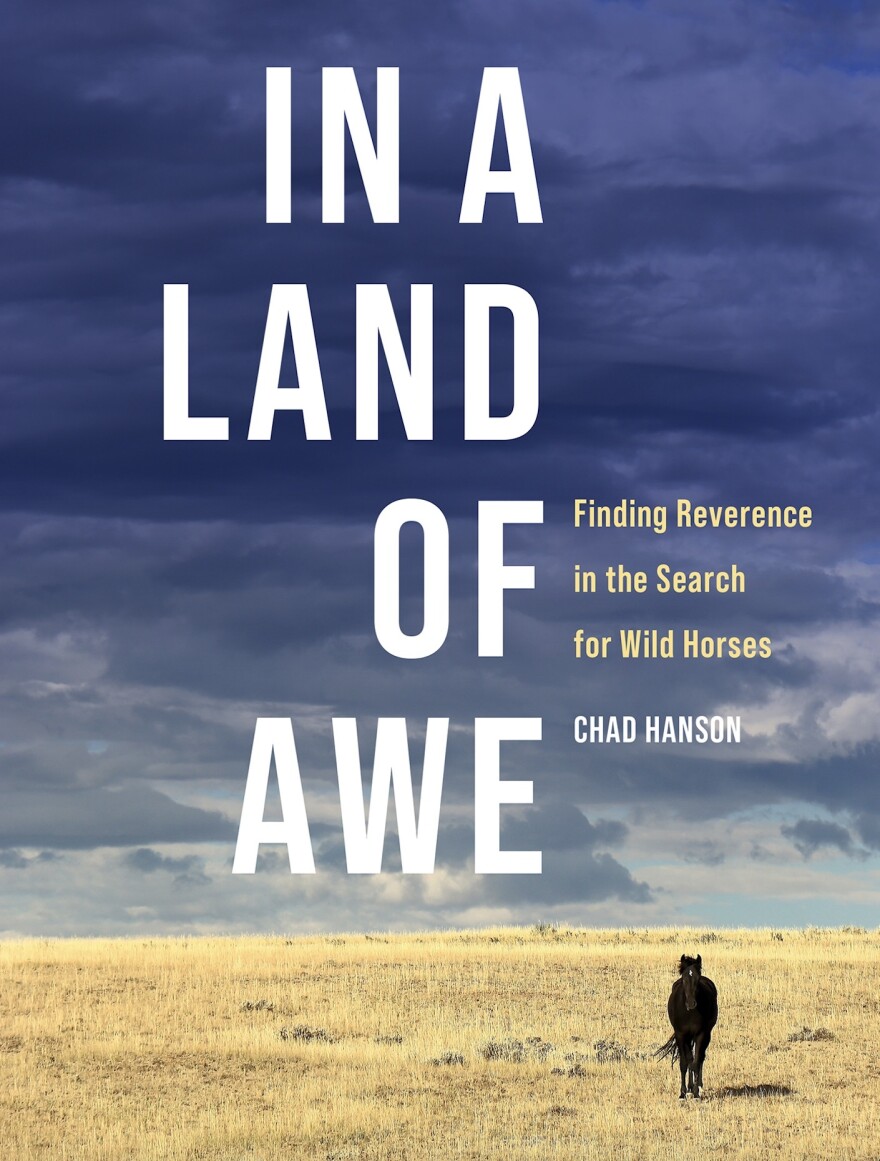Wyoming is home to nearly 4,000 wild horses roaming on public lands, which has often been a controversial topic between ranchers and wild horse proponents.
But, a new book by Wyoming author Chad Hanson advocates for the horses' right to live on public land. The book is called "In a land of Awe: Finding Reverence in the Search for Wild Horses."
Wyoming Public Radio's Caitlin Tan interviewed Hanson.
Caitlin Tan: So Chad, throughout the book, you speak about some of your first experiences seeing wild horses. What stood out to me is that when you first moved to Wyoming as an adult, you were shocked to see wild horses. They were almost kind of mythical. Can you share a little bit about why you're so drawn to them?
Chad Hanson: Yeah, you're right. When I first moved to Wyoming, part of the draw was fly fishing. Once I figured out that Wyoming is home to several bands of wild horses, I thought it was astounding, because up until that point, I just assumed that wild horses were part of our past - something that school kids read about. I didn't think that they still existed. So to discover that they're here, and they're living these incredible lives out on our public land, it felt astounding.
I don't even fly fish all that much anymore. Once I found wild horses, it seems like that's about all I want to do is try to find them and make photographs.
CT: So Chad, you have a really unique way of writing about wild horses and touching on complicated issues like public land use and how wild horses are managed. Often it feels like you take a philosophical and poetic approach. You also reference a lot of other authors throughout the book, to kind of use their words to get at sometimes a larger point.
I'm wondering if maybe you can read an example so listeners can get a little bit of a taste? In this passage I'll have you read, you have just finished helping feed wild horses at a sanctuary in the Black Hills. You look up on the ridge and see a Palomino stallion. I'll let you take it from there.
CH: When people look at each other, the land and animals, we use our eyes to take their measure. There's power in our gaze. But in this moment, I feel the stallion assessing me.
My world is pressed down upon me by the eyes of the horse, my hat, my coat, my boots on the road. My past, my plans, conceits and insecurities. I begin to see myself through the eyes of the animal.
Ralph Waldo Emerson suggested, "Dreams and beasts are two keys by which we are to find out the secrets of our nature."
Our dreams serve as demonstrations of what we can become. For better and for worse, wild creatures show us what we're not. For all the value that we place on freedom. Are we free?
CT: The management of wild horses is obviously a really polarizing issue, especially in Wyoming. Your book advocates for having wild horses on public lands. You point to their beauty, and how they're icons of the American West. I'm wondering what you would hope people who maybe don't necessarily agree with you could take away from your book?

CH: Well, I understand your point about wild horses being polarizing. I actually hear that a lot. But there is some social science on this issue, and it turns out that wild horses aren't really that polarizing. It turns out mostly they're beloved.
The American Wild Horse Campaign commissioned a survey about two years ago, and 88 percent of the American public is really thrilled to know that we have wild horses on our public lands. I think there's a small but maybe vocal minority of people who have other interests when it comes to how public lands are used.
I understand that public lands managers have to have multiple use in the back of their minds, but wild horses, for example, are only present on about 12 percent of the lands that the Bureau of Land Management oversees.
So, they're already on a pretty restricted portion of our public lands and they're really widely respected. I think mostly wild horses are well liked in our culture.
What I would hope that people would take away from the book is for people who were like me and didn't know that we still had wild horses, I would hope that this book would inspire people to head out onto our public prairies to try to find these animals. If anybody was half as inspired as I was at finding these animals and spending time with them, I think it would be worth their while.
CT: Chad, is there a passage that you would like to share with listeners?
CH: Yeah. Here's a passage from one of the later chapters in the book.
'Are there too many wild horses? How many Mustangs do we need?' Like the late wilderness advocate Bob Marshall, I would answer these questions with a question.
'How many Brahms symphonies do we need?' Of course, the answer is all of them. We need big swaths of public grasslands with Mustangs on them more than at any point in our history. We need their majesty in the adventure of striking out to try to find them.
Wild horses also hold the potential to bring us together as a nation. Who among us wouldn't stop to marvel at the sight of a band of mustangs running through a rugged panorama in the West? They're one of the best ideas we have ever had. Highly American, completely democratic.
For Wyoming Public Media's coverage of wild horse management that includes multiple viewpoints on the issue, listen to the ' I Respectfully Disagree ' conversation between four wild horse stakeholders.









